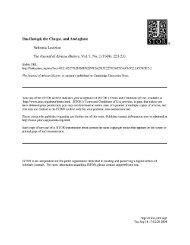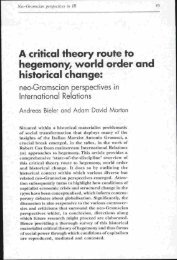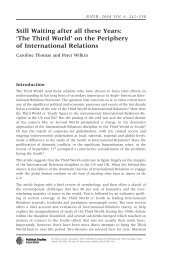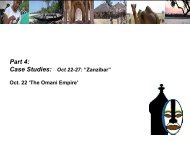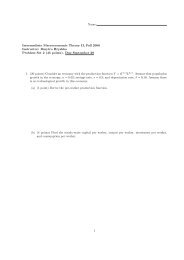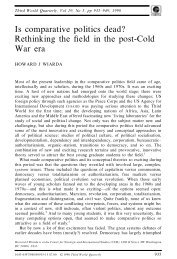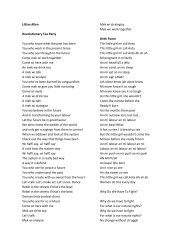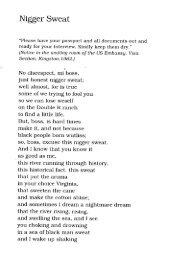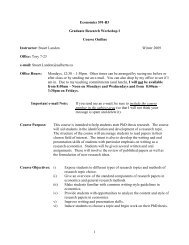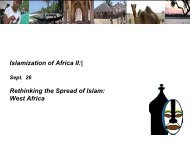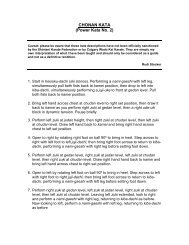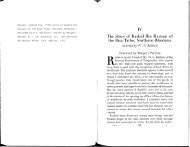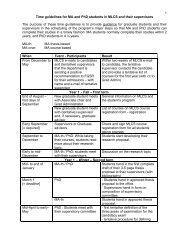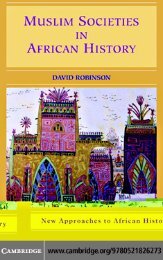personal memories revolutionary states and indian ocean migrations
personal memories revolutionary states and indian ocean migrations
personal memories revolutionary states and indian ocean migrations
Create successful ePaper yourself
Turn your PDF publications into a flip-book with our unique Google optimized e-Paper software.
which in an earlier context had been used to signify a religious leader became<br />
synonymous with fundi, a secular term emphasizing the mechanics of competition<br />
<strong>and</strong> dramatic effect. In their eyes, celebrations of the Maulidi ya Kiswahili were “no<br />
longer rituals for the sake of God’s blessings, but performances which mainly<br />
sought to attract other people’s attention.” 48 At that point, the wangwana still had<br />
sufficient power to have the last word.<br />
Cooper has resolutely argued against a Foucauldian approach to the<br />
analysis of power on the grounds that to embrace it would be to deny the very real<br />
power imbalances that now exist between the neo-colonial powers of the West (the<br />
International Monetary Fund <strong>and</strong> the World Bank) <strong>and</strong> African nation <strong>states</strong>. He<br />
rejects Foucault’s notion of power as “capillary” (presumably referring to the<br />
concept of biopower Foucault developed in his History of Sexuality) because for him<br />
current relations between Africa <strong>and</strong> the West are most emphatically “arterial” <strong>and</strong><br />
one-way. 49 In the East African context, Cooper sees power is a negative, injurious<br />
force rather than Foucault’s more nuanced view that sees power as positive <strong>and</strong><br />
generative as well as destructive.<br />
In his work on slavery in East Africa <strong>and</strong> especially his article on ideology<br />
<strong>and</strong> cultural hegemony, however, Cooper weaves carefully between a view of Islam<br />
as cultural hegemony <strong>and</strong> a view that would allow some agency (counter-hegemony)<br />
for the slaves —something he wants very much to do. His is a delicate balancing act<br />
that is not always taken up by those who have followed. 50 In the section of his<br />
article where he discusses the slaves, he comes very close to Asad’s notion of a<br />
constructed Islam, were it not for the fact that he was looking instead for the<br />
development of a separate <strong>and</strong> unique “slave culture” as a counter-hegemonic force.<br />
He talks about the ways in which people began to think of themselves as both<br />
Muslims <strong>and</strong> connected to non-Muslim Africans through dances <strong>and</strong> initiation<br />
rituals that combined elements of Islam with practices brought from the mainl<strong>and</strong>.<br />
What these slaves were making was Islam <strong>and</strong> in the process, Swahili identity.<br />
I am arguing here for an approach that explores the connections between<br />
Islam <strong>and</strong> Swahili identity; one that does more than reverse the flow of<br />
Trimingham’s model from African to Arab- a methodology that can help us to<br />
escape from loops created by debates about “penetration” <strong>and</strong> “charisma”. I want<br />
to find a way to weave between the universal qualities of Islam <strong>and</strong> its practice on<br />
the ground without becoming enmeshed in debates about orthodoxy. 51 I want to<br />
begin to think in terms of a process of originary syncretism that denies essentialisms<br />
<strong>and</strong> simultaneously allows for both conflict <strong>and</strong> negotiation in the generation of<br />
Islam <strong>and</strong> identity. It is a process that operates on many levels through time <strong>and</strong><br />
space, one that begins to approximate the complexity of religious practice <strong>and</strong><br />
identity formation in East Africa.<br />
Taking Talal Asad’s proposition that Islam (<strong>and</strong> identity) is a project<br />
continually under construction rather than an essence or reified category is a<br />
first step toward creating richness <strong>and</strong> complexity from small bits <strong>and</strong> pieces of<br />
the relics we call evidence. In the performance of a ritual like the Maulidi ya<br />
Kiswahili we can read both agency <strong>and</strong> domination. By including Foucault’s<br />
notion that power can be both generative <strong>and</strong> destructive <strong>and</strong> is embedded in<br />
<strong>and</strong> created by both discourse <strong>and</strong> practice, we can makes space for agency on<br />
the part of subalterns. Then reading such an analysis of power into the<br />
construction of Islam <strong>and</strong> identity, we can begin to investigate, in specific<br />
historical contexts, the ways in which power was negotiated <strong>and</strong> produced at<br />
http://web.mit.edu/cis/www/mitejmes/<br />
17



